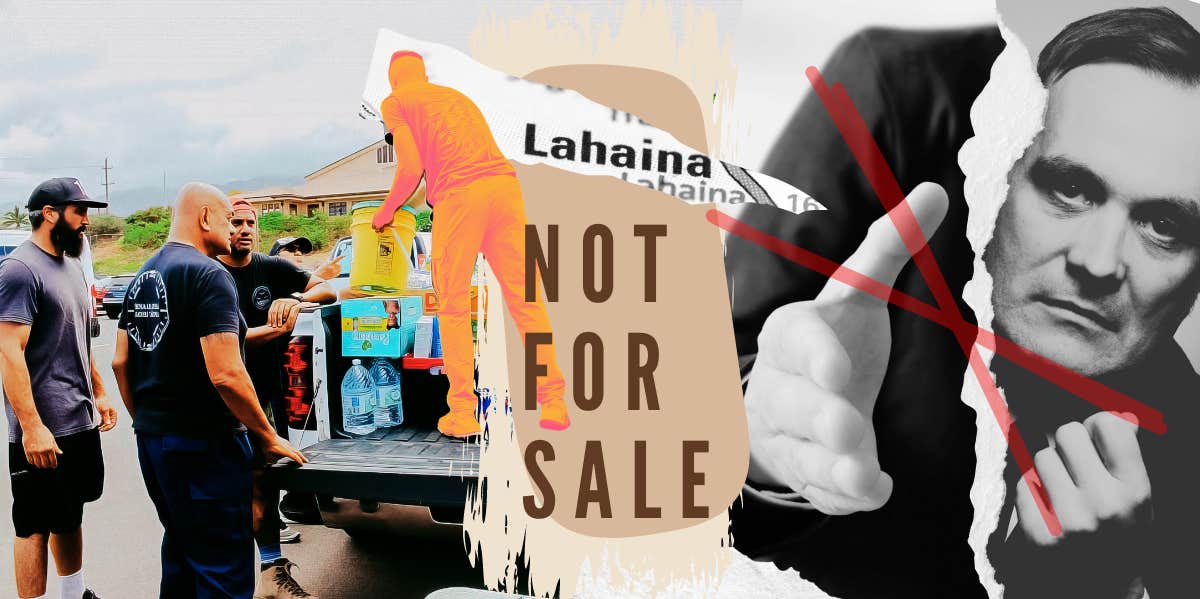Maui Residents Need Help & Resources — Not Greedy Real Estate Developers Preying On Their Pain
Homes for people, not for profit.
 DHHL via MauiNow; Pocketcanoe via Canva; violetkaipa via Canva; SevenMaps via Shutterstock
DHHL via MauiNow; Pocketcanoe via Canva; violetkaipa via Canva; SevenMaps via Shutterstock The Maui wildfires that began on August 8, 2023 have wreaked havoc on the local community in ways that continue to unfold.
In the historic town of Lahaina, it's been reported that 80% of structures are damaged or destroyed. Over 4,000 people have been displaced. Over 100 people have been reported dead, yet the number of lives lost will undoubtedly climb as recovery efforts carry on.
Amidst the destruction, locals have reported another kind of ravaging from investors and realtors seeking to buy their land.
Maui residents don't need greedy offers from real estate developers — they need help and resources.
In an Instagram update from August 13, 20223 on the ongoing crisis, Hawaii Governor Josh Green estimated that over 2,700 structures were destroyed, at a value of $6 billion. He noted the “destruction of Lahaina,” commenting, “There is very little left there.”
“There are people suffering, and we continue to work to find them,” Governor Green exclaimed. “The response has been comprehensive in the last several days. And when I say comprehensive, I mean we are bringing the full force of the government to try to do all we can do to alleviate suffering.”
Yet Maui locals report they’ve been contacted by realtors about selling their land, days after losing their homes.
Kāko'o Haleakalā is an organization that states in its Instagram bio, “We’re on a mission to protect and preserve the Land and native species of the Hawaiian Kingdom.” A recent post made on their Instagram account, featuring a local named Tiare Lawrence, addressed the deeply disturbing claims from locals that their tragedy was being mined for profit.
“I am so frustrated with investors and realtors calling the families who lost their home, offering to buy their land,” Lawrence exclaimed. “How dare you do that to our community right now?”
“If you are a Maui realtor contributing to that, karma’s gonna come and get you. That is pilau,” she stated, using a Hawaiian word that translates to “putrid” or “rotten” in English.
Lawrence spoke to the inherent immorality of outsiders seeking to make money off Maui locals’ massive losses. She said, “If you’re a realtor and investors are calling you to represent them, I hope you have dignity and aloha and compassion to turn them away and tell them off.”
She offered an emotional plea to the people affected by the fires, speaking directly to the residents who lost loved ones and land, saying, “I know it’s hard, and it might feel easier to just move to the continent... We are going to rebuild our town back, so please, don’t leave.”
“You guys gotta stay, especially you multi-generational families, don’t move away,” she tearfully continued. “We’ve already been displaced so much. Do not let this push you away.”
“Just know that you have a community,” she added. “People around the world are going to support you and help you go back home.” She ended her post by stating, “Lahaina is not for sale.”
Governor Green’s response to the assertion that investors have been asking locals to sell their land seemed hollow.
In an Instagram post on August 15, 2023, Green explained that he had reached out to the Attorney General to “explore options to do a moratorium on any sales of properties that have been damaged or destroyed.”
“I could caution people that it’s going to be a very long time before any growth or housing can be built,” he continued. “You will be pretty poorly informed if you try to steal land from our people and then build here.”
The post’s caption read, “Trying to take land away from our people before we’ve had a chance to grieve and rebuilt [sic] is not pono, and we will not stand for it.” The English translation of “pono” refers to righteousness and balance.
Governor Green’s response was hardly impassioned, nor did it offer much in the way of tangible protection for locals, whose right to their own land is threatened.
The Maui wildfires appear to be the result of a tempest of neglect from power companies and the gruesome reality of drought conditions caused by climate change.
That anyone would actively work to profit off people’s pain, in light of such extreme loss, is unconscionable. This moment could be seen as a hairpin turn for where Americans' morals lie.
Between the option of supporting people in need or turning a profit, we can only hope people lead with compassion and actual care.
Alexandra Blogier is a writer on YourTango's news and entertainment team. She covers social justice issues, pop culture analysis and all things to do with the entertainment industry.

